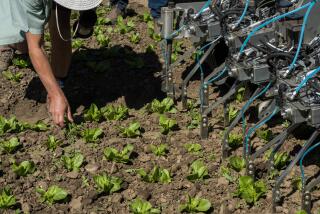You Could Be Replaced by Smarter, Cheaper Robot
- Share via
Question: How will robotics influence our lives in the future?
Answer: A robot may have its eye on your job.
Think it can’t happen? Think you are irreplaceable? Think that no machine could do what you do?
Better reconsider. Robots are getting smarter and cheaper, and to hear employers talk, human labor is getting increasingly expensive and not a bit smarter.
Robots can work day and night year around with no weekends off, no vacations, no sick leave, no time out for meals or coffee breaks. They don’t join unions. They don’t bring lawsuits against their employers. And they don’t expect to be paid a little more every year. So it’s hard to blame the employers who are “hiring” robots by the thousands.
A robot is like a computer with muscles. The computer provides the information, or brain power, and the robot’s metal limbs do the physical work it orders.
The typical industrial robot looks like a large mechanical arm. These robots can paint, sand, hammer, cut, weld and perform hundreds of other tasks, even those outside a factory, such as plucking chickens and shearing sheep.
Robots don’t get bored, of course, so they’re used for many tasks that drive human workers batty. For example, in one factory robots pick up pieces of chocolate candy and place them in boxes, hour after hour at the rate of two pieces per second. No human worker ever lasted more than two years in that job. And since robots don’t have lungs to be damaged by toxic fumes, they are used for industrial welding and spray painting chores.
In the future, robots may take all kinds of shapes:
Robots shaped like snakes could enter small openings in the ground to locate coal or other minerals and bring them to the surface for processing. This would protect human miners from the hazards of cave-ins, fires, poison gases and coal dust.
Robot guards, perhaps wearing blue uniforms and visored caps, could stand guard in building corridors at night to report and challenge any intruder.
Police officers might use steel Dobermans to capture dangerous felons without risking human lives.
Robot lumberjacks, looking like huge spiders, may move through a forest trimming branches, cutting trees and dragging logs to trucks for shipment.
During the 1990s robots will probably enter the construction trades, where they will be used to carry building materials, lift and position wall and floor panels, cut boards to size, lay brick, block and stone.
Eventually robots will mine seabeds and farm the surfaces of the oceans for fuel and food. And they will play a major role in construction and manufacturing operations in outer space.
It is hard to imagine a job that could not be done, at least in part, by robots. And in the future they will not all be harsh steely machines suitable only for a factory environment but will be able to operate well in an office or home situation.
Pet Names and Parties Because of the apparent intelligence of robots, they tend to be anthropomorphized: Factory workers often give pet names to their robots. In Japan, they sometimes hold welcoming parties for new robots who join the assembly line. In the United States, when a robot suffers a breakdown, human workers in the plant have been known to send it a get-well card.
Beyond doubt, an increasing percentage of the work of our society will be done by robots in the future. Unless they have the skills to switch to another line of work, people whose jobs are replaced by robots will face some hard times.
But I think such situations will be rare. Robots will mainly be used to help human workers get more done and to free them from dirty, dangerous and boring jobs. And the use of robots will create some new jobs for humans. Humans will have to program, or instruct, robots in each task turned over to them. Human technicians must repair robots that break down from their work-around-the-clock routines. Human designers will have to develop ever more sophisticated robots for tasks not yet even thought of.
More to Read
Inside the business of entertainment
The Wide Shot brings you news, analysis and insights on everything from streaming wars to production — and what it all means for the future.
You may occasionally receive promotional content from the Los Angeles Times.










